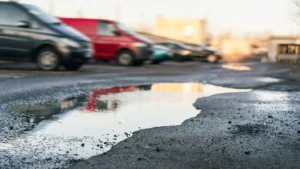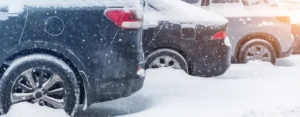As the old scout saying goes ‘be prepared’ and this motto should certainly apply to UK property and estate managers, especially during winter. Having winter gritting and snow removal services in place is an essential aspect to staying operational during severe weather events and mitigating any potential financial losses to your business.
Each winter, British industry loses significant revenue due to ice and snow. These losses often result from supply chain interruptions, employee absences, and reduced consumer spending, especially in the retail and hospitality sectors.
Research suggests that severe winter weather can cost the UK economy hundreds of millions each year. In 2018, for example, the “Beast from the East” storm, which was the result of a polar vortex, saw an estimated £1 billion loss per day, primarily from transportation delays, workplace closures, and supply issues. On average, bad winter weather can lead to around £500 million in losses annually across various sectors.
What is a Polar Vortex?
The polar vortex is a large area of low-pressure, cold air surrounding the Earth’s polar regions. It exists in both the North Pole and South Pole and is a key feature of the planet’s atmospheric circulation. The term “vortex” refers to how this air moves in a swirling, circular pattern, almost like a cyclone, around the poles.
Here are some key points about the polar vortex:
- In the winter months, the vortex strengthens as the temperature contrast between the equator and poles increases
- When the polar vortex is stable, it stays near the poles, containing cold air in the Arctic or Antarctic regions
- If it weakens or becomes distorted, it can cause cold Arctic air to spill southward, leading to extremely cold weather events in parts of North America, Europe, and Asia
- This is often referred to as a “polar vortex disruption” and can lead to intense winter storms and prolonged cold spells in mid-latitude areas.
Sudden Stratospheric Warming (SSW)

- Occasionally, the polar vortex can experience a sudden stratospheric warming, where temperatures rise sharply over a few days. This warming can disrupt the vortex and shift it southward.
- An SSW event can lead to a split or displacement of the vortex, pushing Arctic air into lower latitudes.
When the vortex is stronger than usual, it can bring milder and windier weather from the Atlantic. But if the vortex is weaker, or a Sudden Stratospheric Warming (SSW) event occurs which reverses wind direction, Europe is more likely to experience colder and wintry conditions.
What the Experts Say
Experts from leading weather forecasters MetDesk have said that: ‘Early forecasts suggest the polar vortex will be stronger than usual through December, meaning a major disruption is currently unlikely. At the moment, the polar vortex is helping to create a mild and somewhat unsettled winter outlook. However, if a Sudden Stratospheric Warming happens, colder weather could follow in the weeks after.’
So the conclusion seems to be that even though an extreme event such as the ‘Beast from the East’ is considered unlikely at the moment, it does illustrate how unstable the UK weather can be, and how our weather can change and go cold quickly, even when we are in a period of mild weather.
Being prepared for all scenarios is the clever option, but at the very least, prepare for the worst and don’t be caught out if it does happen.
For expert winter gritting and snow clearance services, contact OUTCO today at 0800 0432 911 to learn how our 20 years of winter maintenance experience can help you stay ahead of severe winter weather challenges.








